Terry Bywater interview: Redcar’s quadruple Paralympic bronze medallist on Tokyo hurt, his long career and inspiring youngsters to take up wheelchair basketball
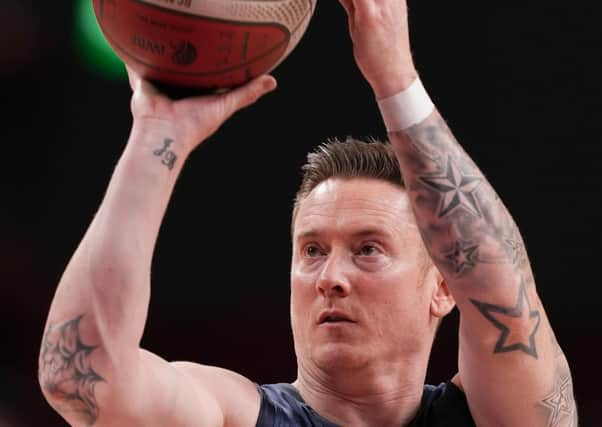

For while the Paralympics is littered with uplifting stories of superhuman athletes triumphing over the cruellest of adversity, actually sparking that into inspiring other disabled people is the biggest challenge.
“That’s the message we need to get across,” says Bywater, 37, from Redcar, who has represented Great Britain six times in wheelchair basketball at a Paralympics.
Advertisement
Hide AdAdvertisement
Hide Ad“I’ve spoken to so many families over the years; whether they’re paraplegic, or an amputee, or confined to a wheelchair. We need to let them know there is a life out there, you can still be who you want to be, there’s nothing stopping you.
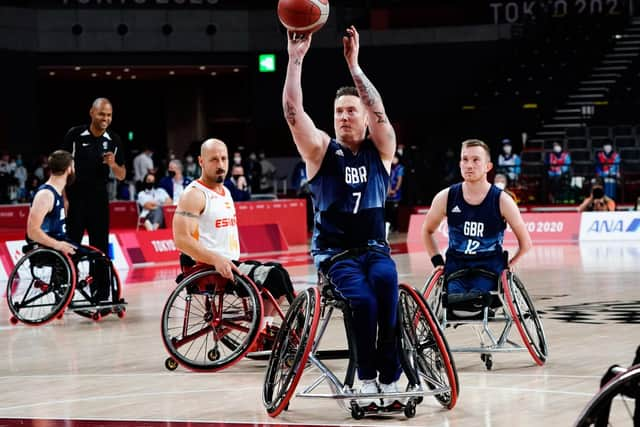

“I used to play football for the school on one leg. I had my heart set on being a professional footballer. Then, at age 11, I realised it was impossible.”
That initial dream was out of reach because Bywater had his left leg amputated shortly after turning two. He was born without a fibia forcing his parents to have to make an unthinkable decision.
“I’ve asked that question to them several times,” says Bywater. “It was one of the hardest decisions of their life, taking away a limb from your two-year-old. It was devastating for them.
Advertisement
Hide AdAdvertisement
Hide Ad“It’s a crazy one, I can’t imagine what they were going through. I was lucky enough to not remember it.
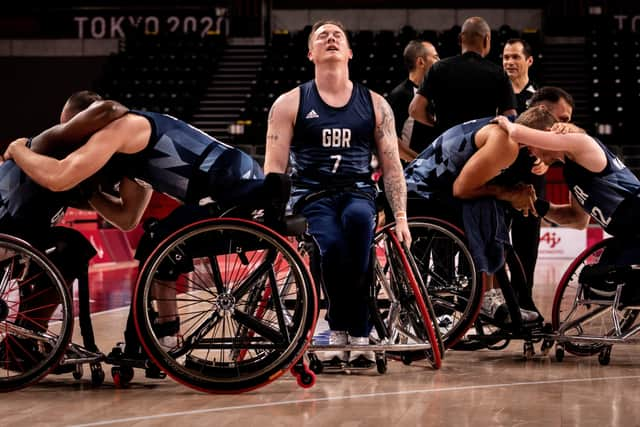

“Looking back now,” he adds with an almost apologetic chuckle, “it’s probably the best thing they ever did.
“Because it’s been my life, I’ve never known anything different.
“Don’t get me wrong, there are ups and downs. There are days when I’m wheelchair bound or I want my crutches because I cannot physically put my leg on. It gets sore.
Advertisement
Hide AdAdvertisement
Hide Ad“Look, I’m an amputee, I have problems with it, but that’s life. If it had have happened later in life it would have been a lot harder to take.
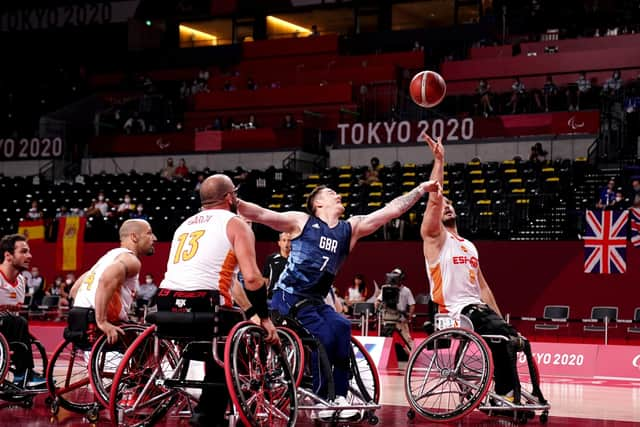

“Whether it be an accident, or a soldier coming back from Afghanistan, it must be difficult to come to terms with, but for me, not knowing any different, it’s been easier.”
Growing up football mad – he is a passionate Middlesbrough fan – Bywater was determined not to let his disability stifle his ambitions.
So when the football dream ended, he was quick to find a new sport.
Advertisement
Hide AdAdvertisement
Hide Ad“I was around about 12 years old in a limb centre in Middlesbrough when I saw an advertisement for an open day to try wheelchair basketball,” he remembers of a life-changing event.
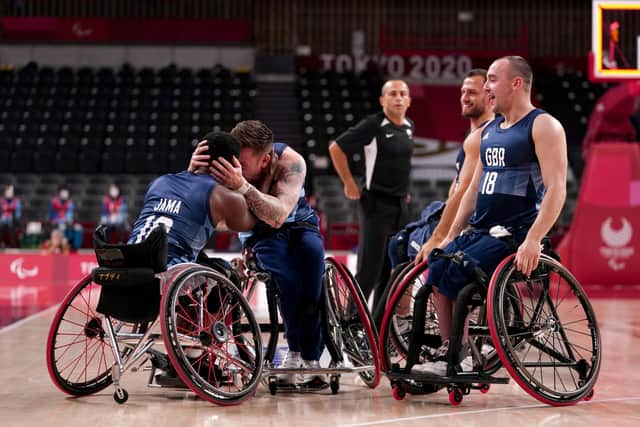

“I went with my parents, it was the first time I’d ever seen it, I was watching people up and down a court, fast as anything, and I absolutely loved it.
“They started a team, I went once a week for fun and absolutely fell in love with it. We set up a team, Teeside Lions, and it went from there.”
Bywater’s career went quicker than most. He represented GB Under-23s at the world championships in Canada in 1997 aged just 15, and had only been training with the senior squad a few weeks in the early summer of 2000 when he was fast-tracked into the Paralympic squad.
Advertisement
Hide AdAdvertisement
Hide Ad“They saw me as one for the future and wanted me to go and sample the experience, it was a dream come true.”
It was also the start of a special journey, one that has taken in 10 European Championships, five world championships and six Paralympic Games.
Along the way, four Paralalympic bronze medals in Athens, Beijing, Rio and Tokyo; some of them celebrated, others a consolation after yet another semi-final defeat.
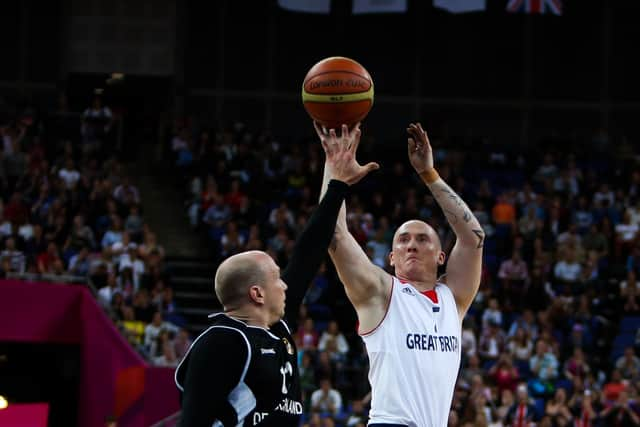

Two weeks since that fourth third-place finish in the Far East, Bywater is still to process what it really means.
Advertisement
Hide AdAdvertisement
Hide Ad“I haven’t stopped thinking about that semi-final loss to Japan, it hurt me big time that did,” he says. “I’m a very emotional guy when it comes to basketball and I’ve shed many a tear throughout my career.
“But, after that loss to Japan I didn’t shed a tear, I didn’t feel angry, I didn’t feel anything. It was strange. I don’t know whether I put up a wall or a barrier of some sort, just knowing we had a huge game for a bronze medal and I didn’t want to leave Tokyo empty-handed having done that in London, which was absolutely heartbreaking.
“It’s the worst game of basketball you can ever play in the bronze medal match. It’s horrendous. It’s all or nothing – you either go home empty-handed or you go home with a Paralympic medal around your neck.
“Japan were better than us in the semi-final. We were 10 points up in the first half, we had one foot in the final. It was one that got away for us.
Advertisement
Hide AdAdvertisement
Hide Ad“We went for something to eat after the game, people had trays of food around them but nobody was eating, it was just silent. One of my team-mates just burst into tears. I wrapped my arms around him, held him for 15 minutes. Normally I would have joined in but I didn’t.
“I think that was me using my experience, I needed to pick these boys up and make sure everybody was ready to play and ready to win a bronze medal the following day because I just felt like if I started showing emotion, as an older guy, it wouldn’t have helped. So I put up a barrier, and sat here now, back home in Spain, it feels a lot more than a bronze. It feels like a gold medal.”
Bywater lives with his family in Spain, where he plays professionally for a team in Madrid. He wants to go on to Paris in 2024, when he will be 40, the dream of playing in a Paralympic final in front of family, friends and a full stadium driving him on.
Wheelchair basketball gave Bywater a life, a good life, an exciting life. And it’s one he wants to use to inspire others who may be sat there thinking their disability can never be turned into a positive.
Advertisement
Hide AdAdvertisement
Hide Ad“I love it when I get a message saying you’ve inspired my son or you’ve inspired us, we want to try basketball,” he says.
“There will be so many families out there with disabled children and they might be holding them back.
“I couldn’t imagine what it’s like to have a disabled child because you don’t know what the future holds for them but, when you have disabled athletes in the pool, on the tennis court, on a basketball court, pushing around a track, it shows there are so many opportunities out there.”
Easy to get into wheelchair basketball
People don’t have to be wheelchair bound to play wheelchair basketball, they don’t even have to be disabled.
Advertisement
Hide AdAdvertisement
Hide Ad“We want to widen participation and introduce wheelchair basketball to as many people as possible,” explains Jo Richards, participation director for British Wheelchair Basketball.
“There are a lot of misconceptions about the sport in general. You don’t have to be disabled to play at all, just use the wheelchair as a piece of sporting equipment the same as you would a canoe or a bike. It’s completely open and inclusive. It’s also exciting and different. Once people have a go they stay for life, it’s a real family feel.”
There are currently 17,000 people playing the sport in the UK. British Wheelchair Basketball want to engage 8,000 more people in the next five years, with a minimum of 500 participants on the Inspire a Generation programme in its first year.
Terry Bywater, as a prominent member of the GB men’s team, gives as much help to the governing body as he can. “The work British Wheelchair Basketball do is absolutely fantastic,” says Bywater.
Advertisement
Hide AdAdvertisement
Hide Ad“We have a women’s league, no one else does in the world; junior leagues. The whole Inspire a Generation they’re doing now is getting hundreds of youngsters playing wheelchair basketball. It’s great for the sport and we’re lucky we have one of the best programmes in the world.”
Get involved at british wheelchairbasketball.co.uk
Comment Guidelines
National World encourages reader discussion on our stories. User feedback, insights and back-and-forth exchanges add a rich layer of context to reporting. Please review our Community Guidelines before commenting.